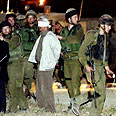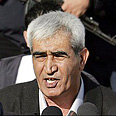

Zeevi killers had it good in Jericho prison
Yedioth Ahronoth reports terrorists incarcerated until last Tuesday at Jericho prison for 2001 assassination of Tourism Minister Rehavam Zeevi were never held in isolation by British, American wards, were allowed unlimited visits and use of cell phones and even left prison grounds on occasion; top terrorists received regular deliveries of high-quality food, cigars, report says. Chief Palestinian negotiator Saeb Erekat: It was a real prison
The terrorists incarcerated until last Tuesday at the Jericho prison for the 2001 assassination of Tourism Minister Rehavam Zeevi apparently had it good. Real good.
The Palestinian detainees, dubbed “The Jericho Six,” were never held in isolation by the British and American wards, were allowed unlimited visits and use of cell phones and even left prison grounds on occasion.
They reportedly received supplies of fresh high-quality food products, and cigars were delivered to Fouad Shoubaki, who was involved in the Katrina A arms ship affair.
A Washington Times reporter told of not seeing one prisoner in any of the cells; only a sweaty, bare-footed prison guard in a worn out uniform. This picture said it all: The guards were the actual detainees, while the Palestinian terrorists were the effendis (‘respected people’ in Turkish).
It is not surprising therefore that Israel received intelligence information indicating that PFLP Chief Ahmed Saadat organized the November 2004 terror attack on Tel Aviv’s Carmel Market from inside the prison.
The foreign supervisors, in a bid to ease Israeli grievances, convinced the Palestinians to place cell phone reception disruptors, which apparently worked only from time to time, depending on who you ask.
“Of course they disrupted the reception,” chief Palestinian negotiator Saeb Erekat said.
“It was a real prison. We kept them in isolation. You and I wouldn’t last a day in there.”
The PA received British complaints on a regular basis. You repeatedly breached the agreements on the prisoners’ living conditions.
“I am not saying there were no mistakes or breaches, but we did not ignore them.”
But diplomats were quick to dismiss Erekat’s claims, and told of what they referred to as repeated Palestinian failures to deal with the matter, which climaxed in recent weeks when the British learned of a plot to take their supervisors hostage following reports that the IDF would not permit the release of the “Jericho Six.”
It is not yet clear how substantial this information was, but American and British confidence in the ability to protect the supervisors dropped as a result.
Saadat even ran his successful campaign for the Palestinian Legislative Council while imprisoned in Jericho; he held a press conference there, stating that the U.S. and U.K. have joined forces with the ‘Zionist enemy’ that locked him up. His words were interpreted as incitement that may lead to attacks on the foreign supervisors.
‘We were shocked when they left’
The initial plan was to have the Palestinian guards serve as the prison wards, while the foreign supervisors would make certain that they would carry out their job, but in actuality the foreigners made due with manning the prison roof, where they did not even have a view of the yard holding 80 Islamic Jihad and al-Aqsa Martyrs Brigades detainees.
The supervisors rarely entered the prison compound itself and were never present during searches of the prisoners’ cells, if these were conducted at all.
Yedioth Ahronoth was told that on at least six occasions the U.S. and Britain recommended ending the farce and sending the supervisors home.
Erekat said he asked British officials to give the Palestinians due warning prior to the departure of their supervisors so the PA may rescue them from the prison before the IDF is able to get its hands on them.
“We wanted to transfer them to the Muqata in Ramallah,” he said. “It was the very least the British could do for us. We were shocked when they left at 9:20 a.m.; five minutes later the Israelis arrived.”
Erekat stopped short of accusing the U.K. of conspiring with Israel, but thousands of Palestinians expressed their indignation by rioting in the streets of Gaza and setting the British culture center ablaze.
British diplomats, for their part, said Israel received no prior warning apart from an announcement on the Friday before the raid that said they intend to leave the prison, without mentioning a time or date.
Even before the IDF operation was completed, the supervisors had already boarded a “British Airways” plane to London.
Tzadok Yehezkeli contributed to the report















